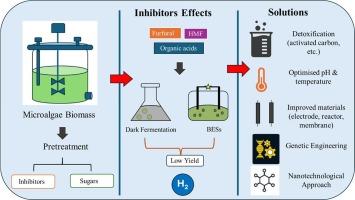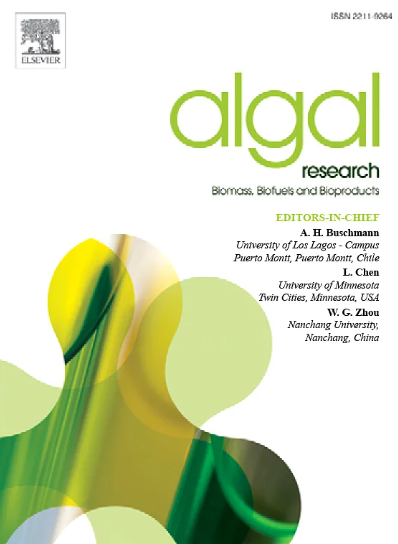Innovative strategies for enhancing microalgae-based biohydrogen production: A review
IF 4.5
2区 生物学
Q1 BIOTECHNOLOGY & APPLIED MICROBIOLOGY
Algal Research-Biomass Biofuels and Bioproducts
Pub Date : 2025-09-23
DOI:10.1016/j.algal.2025.104325
引用次数: 0
Abstract
Microalgae are a promising renewable feedstock for sustainable biohydrogen (bio![]() H2) production due to their high growth rates, carbon fixation ability, growth adaptivity to various aquatic environments, low nutritional requirements, and minimal land use. However, low hydrogen yields and high production costs remain major challenges to their commercial viability. Recent advances in this field have focused on enhancing hydrogen yields through optimised cultivation techniques, pretreatment strategies, and integrated bioelectrochemical systems. Therefore, this review summarises current research on microalgae-based bio-H2 production, highlighting novel pretreatment methods, genetic engineering, microbial immobilisation, and hybrid bio-H2 fermentation systems to display novel strategies for increasing bio-H2 yield. Furthermore, this review focuses on innovative reactor designs, such as microbial electrolysis cells (MECs) and hybrid systems fed with microalgae hydrolysate, to enhance bio-H2 yields, thereby positioning microalgae as a key player in transitioning to a sustainable hydrogen economy.
H2) production due to their high growth rates, carbon fixation ability, growth adaptivity to various aquatic environments, low nutritional requirements, and minimal land use. However, low hydrogen yields and high production costs remain major challenges to their commercial viability. Recent advances in this field have focused on enhancing hydrogen yields through optimised cultivation techniques, pretreatment strategies, and integrated bioelectrochemical systems. Therefore, this review summarises current research on microalgae-based bio-H2 production, highlighting novel pretreatment methods, genetic engineering, microbial immobilisation, and hybrid bio-H2 fermentation systems to display novel strategies for increasing bio-H2 yield. Furthermore, this review focuses on innovative reactor designs, such as microbial electrolysis cells (MECs) and hybrid systems fed with microalgae hydrolysate, to enhance bio-H2 yields, thereby positioning microalgae as a key player in transitioning to a sustainable hydrogen economy.

加强微藻生物制氢的创新策略综述
微藻具有生长速度快、固碳能力强、对各种水生环境适应性强、营养需求低、土地占用少等优点,是一种很有前途的可持续生产生物氢的可再生原料。然而,低产氢率和高生产成本仍然是其商业可行性的主要挑战。该领域的最新进展主要集中在通过优化培养技术、预处理策略和集成生物电化学系统来提高氢气产量。因此,本文综述了目前基于微藻的生物h2生产研究,重点介绍了新的预处理方法、基因工程、微生物固定化和混合生物h2发酵系统,以展示提高生物h2产量的新策略。此外,本文重点介绍了创新的反应器设计,如微生物电解细胞(MECs)和微藻水解物的混合系统,以提高生物h2的产量,从而将微藻定位为向可持续氢经济过渡的关键角色。
本文章由计算机程序翻译,如有差异,请以英文原文为准。
求助全文
约1分钟内获得全文
求助全文
来源期刊

Algal Research-Biomass Biofuels and Bioproducts
BIOTECHNOLOGY & APPLIED MICROBIOLOGY-
CiteScore
9.40
自引率
7.80%
发文量
332
期刊介绍:
Algal Research is an international phycology journal covering all areas of emerging technologies in algae biology, biomass production, cultivation, harvesting, extraction, bioproducts, biorefinery, engineering, and econometrics. Algae is defined to include cyanobacteria, microalgae, and protists and symbionts of interest in biotechnology. The journal publishes original research and reviews for the following scope: algal biology, including but not exclusive to: phylogeny, biodiversity, molecular traits, metabolic regulation, and genetic engineering, algal cultivation, e.g. phototrophic systems, heterotrophic systems, and mixotrophic systems, algal harvesting and extraction systems, biotechnology to convert algal biomass and components into biofuels and bioproducts, e.g., nutraceuticals, pharmaceuticals, animal feed, plastics, etc. algal products and their economic assessment
 求助内容:
求助内容: 应助结果提醒方式:
应助结果提醒方式:


